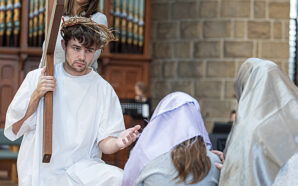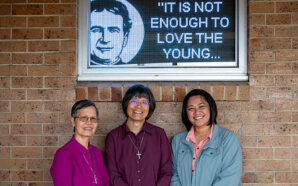Since 2015, philosophers Meghan Sullivan and Paul Blaschko have taught “God and the Good Life,” the most popular undergraduate course at the University of Notre Dame. They spoke recently with assistant editor Griffin Oleynick about their new book based on that course, The Good Life Method: Reasoning Through the Big Questions of Happiness, Faith, and Meaning. This interview has been edited for clarity and length.
Griffin Oleynick: You write that two of the best tools for leading a good life are learning to ask good questions and learning to have good conversations. What are the characteristics of each?
Meghan Sullivan: The ability to ask better questions is something we spend a lot of time on with our students, and in fact it’s something we grade them on. We get this from Socrates, who was killed by the Athenian government in 399 BC for asking too many questions.
One of the distinctions we make early on is that questions can be used either for or against other people.In our political life right now, we find many examples of what we call the “prosecutor question.” It’s aimed to get somebody on record as having a certain view or position so that you can then critique or attack it.
Imagine that I see Paul and that I really want to get into it with him about why he’s a vegetarian. I’d say, “Hey, Paul, just asking, why do you hate eating animals so much?”
That’s not really a question because it presupposes that I already know what Paul’s going to say. I just want him to put his reasons on the table so I can argue with him.
Instead, a philosophical question is what we call a “dinner-party question,” and it gets a conversation going.
It’s been a while since a lot of us have been to dinner parties, but at a really great dinner, the host will ask the group an open-ended question in order to try to learn something about someone in the room they don’t already know.
So suppose I wanted to ask Paul a dinner party question about his views on animals and food.
I might ask, “Paul, when was the first time in your life you remember having a view about why the food you eat might matter?” I don’t know what Paul’s going to say next. No matter what, I’m going to learn something about what Paul’s reasons are.
I’ll also learn something about Paul. I’m not thinking about my next moves, or what I’m going to attack.
I’m genuinely open to learning something about the world that I don’t already know.
And that’s the art of a philosophical question: curiosity, really wanting to figure things out. Even if Paul and I don’t reach a consensus—that rarely happens in philosophy—we’re both going to leave having learned something we didn’t know before.
Paul Blaschko: At the heart of our course and our philosophical method is an ancient tradition called “virtue ethics.” It holds that human beings have some sort of definite function or purpose.
In the Nicomachean Ethics, Aristotle gives us a fascinating argument: he says that the primary function or purpose of human beings is to reason, to reflectively guide our lives. He thinks we all share the same goal: to be happy, and deeply so.
This isn’t just experiencing feelings of happiness, or what we might call subjective well-being.
Aristotle insists that we want to achieve eudaimonia, which is a well-ordered, reflectively directed, happy life. And it’s not just for ourselves. We’re supposed to share it with the people who matter most to us, our family and our friends.
So according to Aristotle this requires us to reflect on the different “excellences” in human life, those things that allow us to achieve our function, happiness, in characteristic ways.
Aristotle calls those excellences “virtues.”
When we explain this to students, we use the analogy of a knife. A knife is designed with a certain function: to cut things. One “virtue” or excellence of a knife is to be sharp.
Another is to be made out of metal, or another sturdy material, etc. It’s the same with human beings. We can discover what human virtues are by reflecting on our function—that is, on what it takes to be happy, and what happiness consists in.
Why are virtue ethics so important right now? And what’s wrong with one competing ethical theory you identify in the book, consequentialism?
Meghan Sullivan: When a lot of folks think about ethics, they think about taking a poll. They ask, “What’s everybody’s current opinion on some controversial issue?”
Think about how we might approach the ethics of Facebook. We’d take a survey to see how people think about privacy. Facebook will be acting “ethically” if it tries to make the most people happy about what they think they want most right now.
We’ve lost touch with the much more significant, two-thousand-year old idea that ethics is a goal we might be wrong about in our particular moment in time.
We may all have different, even distorted views about why privacy matters. But in fact, there’s a much deeper human need—for a private life, for family life, for public life—that’s much more complicated than anybody has time to grasp in our current moment.
Just trying to see what everybody’s thinking right now—ethics as the practice of conducting surveys on each other—is a mistake. A really tempting one, especially for democratic people like us, but still a mistake.
Consequentialism, which is taught on many college campuses and is one of the dominant methodologies for approaching ethics today, tries to make our moral lives both significantly harder and significantly easier.
The basic idea is something like this.
Imagine you’re Mark Zuckerberg and you’re facing a decision: Should you take Facebook out of existence? Or you’re Paul and you’re deciding whether you should give up eating meat. Or you’re me and you’re trying to decide how much money you should give to charity this year.
Consequentialism says there’s really only one principle you need to think about: Which of your options is going to have the most morally significant consequence?
Usually, you measure significant consequences by how much happiness you put out into the world as a result of your action. That’s a version of consequentialism called utilitarianism.
Say I’ve got a choice about where to donate money—either to a local art museum or a charity that’s going to cure malaria for children in sub-Saharan Africa.
Even though I might enjoy art a little bit more, I’ll make more people happy by giving it to the malaria charity. Consequentialism says give it to the malaria charity.
So it makes your life easy, in the sense that it gives you a determinant judgment. But it also makes your life hard because you have to perform this kind calculation every time you make a decision.
Maybe I just turn my entire life into this system that redistributes funds to people in need elsewhere.
Or maybe I really internalize the message of consequentialism, that my moral worth depends on how consequential my actions are in the world.
I can then start to feel the heavy weight of nihilism, realizing that at the end of the day, I don’t contribute very much to anything. And so I despair.
We live in a consequentialist world. People are always trying to optimize every dimension of their lives: how they spend their free time, how they act as parents, how they spend their money, how much they use technology, how much they sleep. In a world of constant optimization, we can feel crushed.
There’s another, more personal way of analyzing our moral worth and understanding how we make decisions: the philosophical apology. Tell us about that.
Paul Blaschko: The philosophical apology is the big assignment we give our students. We ask them to write down a narrative, a story about their beliefs that also explains why they hold those beliefs.
It’s a defense—a form that’s different from the ways we often use stories in the contemporary world, whether to manipulate each other, to excuse behavior, or to push people around.
Instead, by telling you my life story and giving you my reasons for why I believe what I believe, I’m inviting you into the inner conversation that I’ve been having with myself my whole life. And now we can connect on a deep philosophical level.
We have our students answer four big questions in our course. How should you treat other people? What should you believe? Should you practice a religion? What would make your life meaningful?
At the end of the semester (and really throughout the entire course) we get to hear their answers. That’s one of the most powerful parts of the class.
It’s a moment of vulnerability, as well as connection: students resonate with our stories, and with each other’s, and they start to see that this is the space of philosophy.
There’s a risk though: we can deceive ourselves and others through the kinds of stories we tell.
Imagine that I’m late for a meeting at work. I walk in and tell my colleagues, “Gosh, there was so much traffic out there, and the roads were icy. Sorry I was late.”
Here I’m telling a story that takes responsibility off myself, because the world frustrated my virtuous desire to be there on time.
Or I can tell a different story. I can say, “You know what? I was selfish. I slept late, I knew there’d be traffic. I knew I’d probably be late, and I’m sorry for wasting your time.”
Admittedly, this would be a weird meeting. But the point is that now I’m using a story to take responsibility.
It involves what the philosopher Bernard Williams would call a “morally thick” concept—in this case, selfishness. Notice that it’s very descriptive: it picks out my motivation, some part of my agency, and makes that an essential part of the story.
Now, instead of being a kind of object, where I’m just pushed around by forces beyond my control, I become an agent. This is really important.
Elizabeth Anscombe, one of my favorite philosophers, takes this insight as a jumping off point for living the good life and for acting ethically.
You’re both Catholic believers, though your faiths arose in different contexts and are inflected in different ways. Why is it philosophically important to ask questions about the existence of God?
Meghan Sullivan: We do a disservice to people who are curious about God when we hit them with the really big metaphysical questions and debates right off the bat.
Developing authentic religious faith, and finding its role in your understanding of the good life, is really a matter of cultivating small desires, and then larger and more expansive ones.
In our course, we start with really mundane, seemingly everyday questions about what our students are aiming for in their lives. And then we try to get to a deeper level.
We ask: What are your goals for loving other people in your life? What does it mean to really care for them?
What does it mean to see and appreciate them, even in the midst of the serious suffering that love sometimes brings into our lives? That leads to questions of meaning: What does it mean to be grateful for these people in your life?
These questions of gratitude, as we argue in class and as we’ve discovered in our own lives, push us to probe even further: Are there things that are bigger than us?
Are there forms of good that are even larger than the kinds of things we identify as the best things in our day-to-day life?
That’s an opportunity to start to see God, and to see what a desire for God looks like. Once we introduce the idea of God into what’s motivating and driving our students’ lives, the flood gates open.
Questions that we thought were perhaps a bit easier at the beginning of the journey now seem much more complicated.
Our students come from different religious backgrounds and starting points, and it’s important that we treat these questions authentically.
Almost nobody reads St. Anselm’s ontological argument for the existence of God, does the math, and then quickly decides to go and get baptized.
For almost anybody that I’ve met that has religious faith, it was the cultivation of love and appreciation and attention that philosophy came along and fed, asking them the right questions and giving them intriguing hints about what the answer might be.
Then theology gave them visions and metaphors and stories, ways of trying to feed that desire.
And then they brought themselves and their own experiences and, frankly, their own call from God into their vision of the good life.
So we try to honor how that process actually goes in real people’s lives, introducing them to philosophers who also honor and critique that process.
Paul Blaschko: One of the most important things that philosophy can add to a religious person’s life is a way of engaging the intellect in a really clear, intelligible way.
If we’re part of a religious community, there may be a temptation to shy away from logical arguments and rigor. We might just say, “Okay, we’ve figured that out. If we have to debate some outsider or nonbeliever, then fine, we’ve got the reasons.”
But for me, especially in my own life growing up, it was always incredibly important to know why I believed what I believed. It gave me a kind of agency.
If somebody came to me and said, “We’re Catholic, and this is what the Catholic faith teaches,” I could go and say, “Well, wait a second. Does it really? Am I being presented with a true representation of the faith, or does this person just want me to think what they’re thinking?”
So arguments for God’s existence, and the other kinds of philosophical thinking we do around religion, can actually be really empowering for believers.
Paul, you’ve mentioned the idea of agency repeatedly. Could you tell us what passivity and contemplation can contribute to our understanding of the good life?
Paul Blaschko: As we were writing this book, we were going through the early stages of the pandemic.
At that time, Meghan and I had been leading very busy, active, and goal-driven lives, which of course had to be slowly restructured. I vividly remember watching events and appointments just drop off my digital calendar, until it became a blank grid.
In the midst of that kind of experience, you have a miniature crisis.
You think, “If those are the things that give my life meaning, if that’s what it’s all about, what do I do? Should I just put my life on pause for a while? Is there any way of even thinking about what a good life would be when you’re forcibly cloistered?”
Philosophy gives us an incredible answer, which is: Yes! And in fact, maybe this is something that you should have been cultivating all along, and here’s your opportunity to do it.
Philosophy tells us that there is a way of approaching the world contemplatively that’s essential, that you can’t not do.
A quick clarification: I want to contrast this understanding of contemplation with the notion of just relaxing, or chilling out, or taking a vacation. Of course those are important.
But in our culture, relaxation and leisure are often in service of the active life: I’m going to take a weekend off so that I can just crush it at work.
That’s not what philosophers mean by contemplation. Contemplation is almost a mystical thing.
Aristotle says that it draws on the divine part in us, that it’s the most divine experience we can have. He ends the Nicomachean Ethics by saying that it’s ultimately something beyond our grasp, that we’re just barely able to do it.
So how do you make this concrete? Well, in our course we turn to the Stoics. I’ll tell another story. During the pandemic, I would take a lot of walks, both with Meghan (we’re good friends, and live right next to each other) and with my family.
One time, I was out with my family and turned the corner. I saw a street full of cherry blossoms, and it just hit me: the scent, the colors, the shapes. I thought, “That’s amazing!”
At the time, I’d been reading a lot of Marcus Aurelius.
His Meditations ponder mundane things like bread and rotting fruit, which he uses as jumping-off points for deeper reflections on topics like mortality.
With this in mind, as I looked at the cherry blossoms, I noticed a sadness in myself. I wondered, “Why am I sad? This is beautiful.”
As I was looking back and forth between the cherry blossoms and my kids I began to think, “I’m already sad because I know that tomorrow the cherry blossoms will be on the ground. They’re going to be mushed up, wet, and disgusting.”
When I got home, I realized that I’d been letting the anticipation of what was coming intrude on the beauty of the moment. I wasn’t allowing myself to be present to it.
So I put a little sticky note on my computer: “Things that are beautiful are no less beautiful because they’re not permanent.”
Being reminded of that on a daily basis disposes you differently. It changes your soul.
Now, when I look at my kids, I can feel that same disposition of being present, to just see them, to enjoy that community and that life.That’s one practical way in which we can start to achieve what philosophers have talked about as a life of contemplation.
Griffin Oleynick is an assistant editor at Commonweal. This article first appeared in Commonweal Magazine.
With thanks to Griffin Oleynick and La Croix International, from where this article was sourced.








